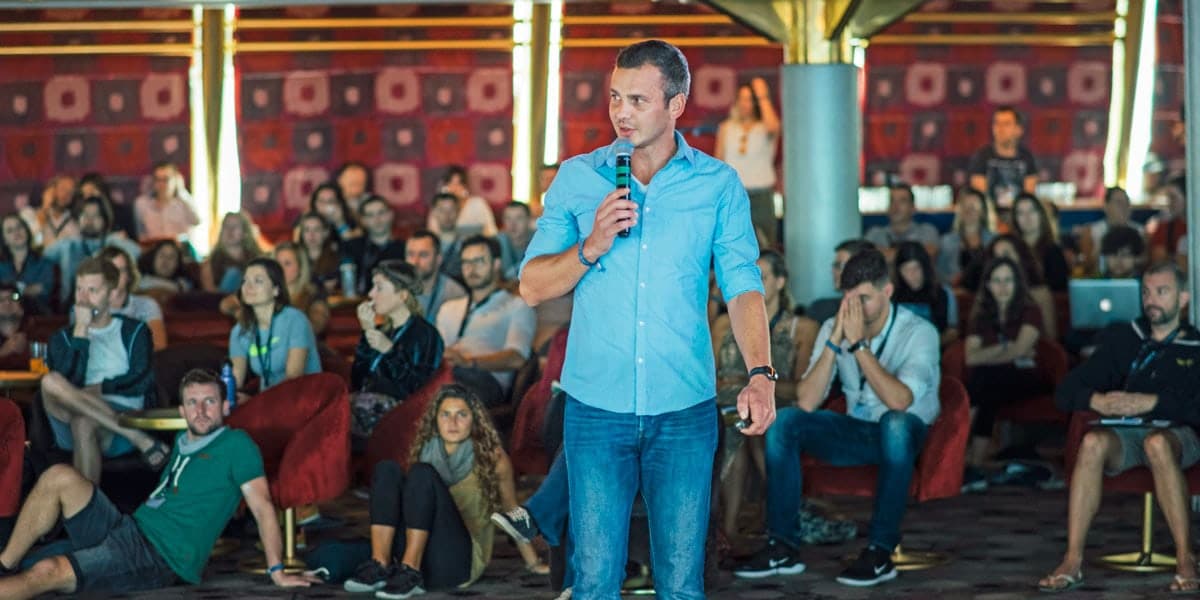Many of our readers are interested in location-independent business models and remote work. But what are the pitfalls? What does location-independent working really mean? How does networking work? And how can agencies trust their employees more when working from home? Eight questions for Sebastian Kühn from the Citizen Circle community.
Whether it’s misconceptions about your dream job, bureaucratic obstacles or a lack of self-discipline: digital nomads or remote teams and managers face numerous challenges. Our interview shows you how these can be overcome together.
More personal responsibility with remote work
Sebastian, the interview Becoming a digital nomad on our blog was by far the most read in 2019. Why are time- and location-independent business models so fascinating?
First of all, it should be said that the cliché of the digital nomad, who earns their money in a hammock with 4 hours of work, has of course been given an image by the media that can be critically scrutinised. Digital nomads are as diverse in their personalities, needs and desires as other groups of people are. What unites us is a common set of values based on self-determination and personal responsibility.
I think many people today feel a lack of purpose and a longing for adventure, which they see as being satisfied by digital nomadism. Personally, I am fascinated by the freedom to work from anywhere – and to be able to choose my working hours and content relatively freely. I see my companies as playgrounds where I can develop as a person. I didn’t have these opportunities when I was an employee.
Working remotely: Advantages & disadvantages
Are you interested in working remotely? You can find more information on this in our articles Becoming a digital nomad, Leading a team remotely and Advantages & disadvantages of remote work.
Pitfalls for digital nomads
Relaxed working under palm trees is a common cliché that you are addressing. Location-independent work is not always as easy as people imagine. What do you think are the three biggest pitfalls of the concept? And how do you overcome them?
Point 1: Many people chase after a dream without asking themselves critically whether they can bear the uncertainty that comes with it. Do they want to take the risks and really take full responsibility for their lives? That’s why the question “Who am I and what do I actually want?” is at the beginning of all considerations. So that I don’t realise after a few months that I have acted against my own values.
Point 2: There are bureaucratic obstacles that need to be overcome. Should I deregister? How do I open a bank account without a permanent address? Where do I pay taxes? In which country should I register my company? How do I insure myself? Here I have to look for solutions on my own responsibility and can no longer hide behind the care of the state.

Point 3: The frequently changing environment and the freedom to organise my time are both a blessing and a curse. It takes discipline and routines to work productively when I no longer have fixed office hours. I stay in the same place for at least a month to create a productive working environment. When I’m travelling faster, I travel and only work in “maintenance mode”. Travelling (fast) and working at the same time is an illusion for me.
What qualities should you personally have to be able to live the model in the long term? And who should stay away from it?
The values of freedom and self-determination should be more pronounced than the desire for stability and fixed structures. I have to be able to withstand uncertainty and adapt to new situations. I must also be prepared to take full responsibility for my life, both in terms of successes and failures. What is generally true for the self-employed is even more so if you move around a lot.
Planning WordPress projects: From requirements to implementation
We spoke with Ben Hutchison-Bird from NINE Brackets about key strategies for translating client needs into successful WordPress and WooCommerce projects.
Tools for remote work
Remote leadership – leading from any location: How can you still stay close to your employees? And recognise moods in the company or agency?
This is a challenge that our ten-strong team in Citizen Circle, which is completely remote, is currently growing into. In addition to communication via Slack chat, project management via Trello and Google tools and weekly team calls, we believe that personal contact is essential.
We have one day a week on which we not only have a team call, but also schedule virtual coworking time. We use breakout rooms at Zoom to discuss things in small groups over short distances. Otherwise, we consciously plan on-site times every few months in the closest circle in which we work together in sprints. The extended team comes together at least every 6 months to cultivate interpersonal relationships. And to create a sense of unity.
Tools for the home office and remote work
Do you work in an agency or as a freelancer in a home office or remotely? And are you still looking for the right infrastructure? Then read our tips on home office tools such as Slack, online meetings, Aircall, Zoho, Google Cloud, etc.
Do companies in the technology sector need to jump on the remote bandwagon if they want to find enough new employees in the future? What does the corporate culture need to look like to ensure that the remote model does not fail?
We are currently experiencing how remote working can work even for large corporations in this coronavirus era. In order to find the best employees in the future, I think incentives such as flexible working locations and hours, the opportunity for personal development within the company and co-determination are extremely important.
Trust in employees should be firmly anchored in the corporate culture (this goes both ways). We try to involve our team in as many decisions as possible and give them more and more responsibility. At the same time, we are always trialling new working models, such as the current 3-day week.
Managers: relinquish control
Many companies or agencies fear a loss of control if they allow their team to work from home. How can this dilemma be solved?
Every manager needs to work on their own attitude here. The desire for control usually stems from their own ego – I want to feel important and needed, so I control my employees’ every move. However, they can never learn to work independently in this way.
The better goal for me as an entrepreneur or manager is to make myself superfluous. If I am only needed a little, then I have done a good job (even if my ego sees it differently). Then I can work on the company instead of losing myself in small-scale day-to-day work.
The Citizen Circle is a community for digital, time- and location-independent business models. How did you get involved in this topic yourself?
I have been travelling the world as a digital nomad since 2012. Especially in the beginning, I often missed the opportunity to socialise with like-minded people, which is why I started to gather other digital freelancers around me early on. At the beginning of 2017, I joined the founding team of Citizen Circle, which was founded in 2015 by Tim Chimoy, Kris Braun and Dennis Hessenbruch.
An African proverb says: “If you want to go fast, go alone. If you want to go far, you must go with others.” With this attitude, we are growing together with our current 500 members.
Community for remote work
Who can jointhe Citizen Circle ? And how do you support your members?
We welcome all free thinkers and those who want to do things differently and are looking for a home. The focus in our community is on digital self-employment, although other life topics such as health, relationships and money are also addressed time and again. We use location-independent business to bring more freedom back into our lives, although this is by no means the end goal.
We offer an extensive online platform with video courses, forums, mastermind groups, a very active slack chat and regular online workshops. Our members network there to set up companies together, place orders with each other, get feedback on ideas or support each other in marketing their offerings.
To create a link between the online and offline worlds, we organise conferences abroad twice a year as well as two larger meetings within Germany. Our members also meet at monthly local meetings in 15 cities in the DACH region. We also organise regular “Workations” (a mix of Work+Vacation). See the overview of our events.
Work from anywhere: Your questions
What questions do you have for Sebastian or about Remote Work? Feel free to use the comment function. For more insights on WordPress, web design or online business, follow Raidboxes on Facebook or LinkedIn – or subscribe to our newsletter.

Leave a Reply